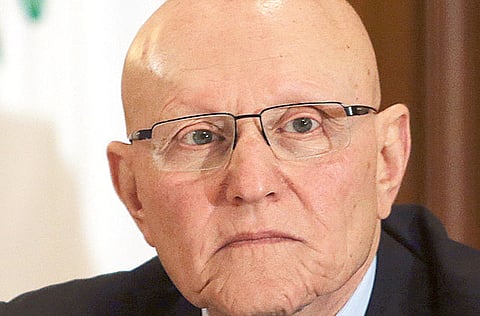Saudi Arabia blacklists firms, expels several Lebanese nationals
GCC ‘does not want a Lebanese confrontation with Iran, but a dissociation from its positions’

Beirut: Four Lebanese companies doing business in Saudi Arabia were blacklisted on Friday as several Lebanese nationals were barred from the country.
Vatech S.A.R.L, Le-Hua Electronic field Co. Limited, Aero Skyone Co. Limited and Labico S.A.L will no longer be allowed to operate in Saudi Arabia.
Fadi Hussain Sarhan, a 55-year-old Lebanese national, along with Adel Mohammad Sherri (53) and Ali Hussain Zeaiter (49) were also barred, in addition to an estimated 90 others whose employments were terminated. Most were given a few days to leave the country. Under Saudi law, any assets linked to the named men and companies will be frozen, and Saudi citizens are now forbidden from doing business with them.
On Friday, Saudi authorities escalated their week-old row with Lebanon, in what was a classic political dispute over the role that Hezbollah plays in the country, muzzling Prime Minister Tammam Salam’s government into action.
There were no signs that the crisis would abate anytime soon, as Riyadh affirmed its positions. “The kingdom continues to combat the terrorist activities of the so-called Hezbollah with all available means,” the Saudi ministry of interior declared in a statement carried by the state-run SPA news agency, “and will continue to clearly deal with global partners as no state or international organizations should overlook Hezbollah’s militias and its extremist activities.”
The statement further accused Hezbollah of “spreading chaos and instability, in addition to waging terror attacks and practicing criminal and illegal acts across the world,” claims that were strengthened after a video emerged on Thursday that showed a Hezbollah cadre training Al Houthi militia in Yemen. In addition to this powerful visual evidence, the Saudi ministry of interior under the leadership of Crown Prince Mohammad Bin Nayef Al Saud suggested that Hezbollah and Al Houthi militia were smuggling drugs into the kingdom.
A week ago, Riyadh ended a $4 billion (Dh14.69 billion) aid package to the Lebanese armed forces, dejected by excessively violent rhetoric against the kingdom by Hezbollah officials. Popular songs attributed to Ali Barakat, a pro-Hezbollah singer against Saudi Arabia did not sit well. Worse, Saudi officials were livid that Lebanese officials from all denominations failed to end these attacks, which culminated by two mistaken no-votes at the League of Arab States meeting in Cairo and another at the Organisation of Islamic Cooperation in Jeddah. In both instances, Lebanon stood alone outside the Arab consensus, which left the impression that Beirut sided with Iran.
Saudi Arabia, Kuwait, Bahrain and Qatar have now warned their citizens against visiting Lebanon. The United Arab Emirates banned its citizens from traveling to Lebanon altogether, and drastically reduced the size of its diplomatic mission in Beirut.
Although several March 14 officials called on the prime minister to restrain Hezbollah, only the Lebanese Forces leader, Samir Geagea, maintained that “The [Gulf Cooperation Council] countries didn’t ask Lebanon to get into a confrontation with Iran, but rather to dissociate itself from it.”
“Hezbollah walked in the other direction,” affirmed Geagea, while the government “stood still.”
Speaking to Al Sharq Al Awsat, Geagea emphasised that “We are either a state or not. And if we are a failed state then the world will allow itself to overcome our sovereignty,” calling for a rapid rectification of committed errors. Those who cannot assume their responsibilities, he insisted, “should quit.”
Sign up for the Daily Briefing
Get the latest news and updates straight to your inbox



